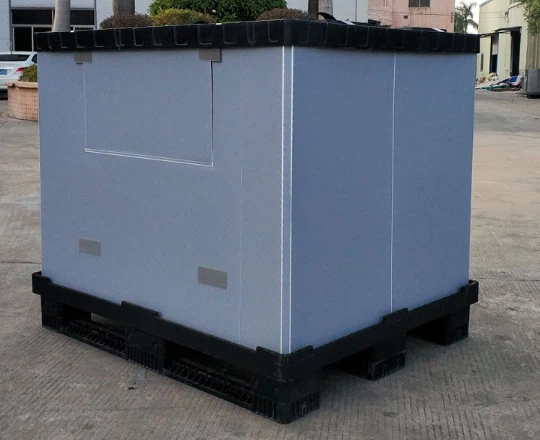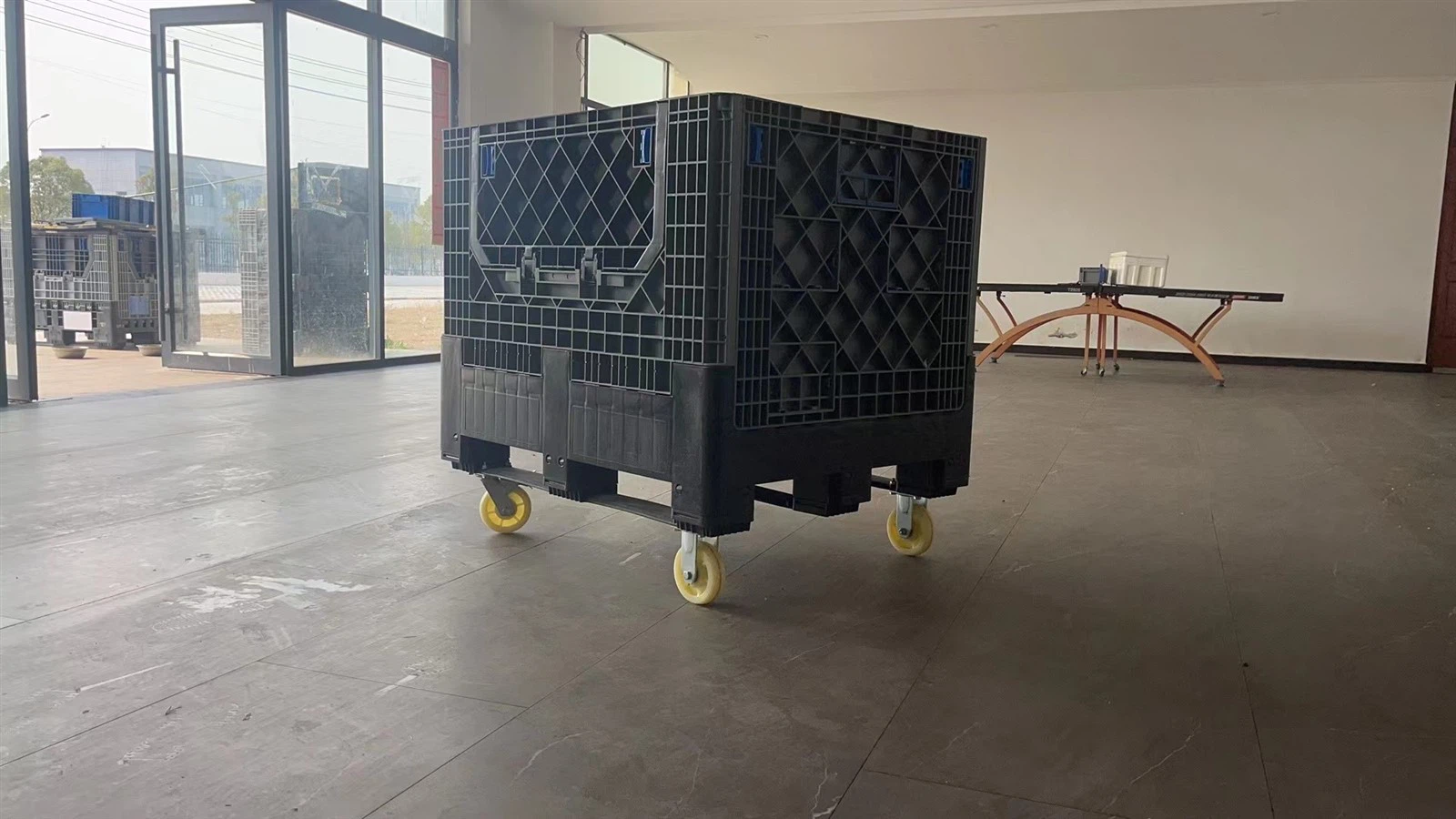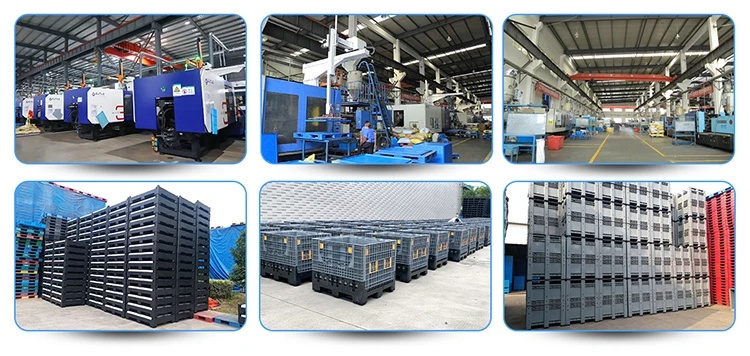Which Type of Pallet Box Is Best for Automotive Parts?
Leave a message
intro
In the automotive industry, every part in transit matters. You need packaging that protects sensitive components, maximizes loading efficiency, and cuts transport costs. Traditional cardboard boxes or metal containers often fall short, either lacking strength, foldability, or supply chain flexibility.
That's why more OEMs and Tier 1 suppliers are switching to foldable plastic pallet boxes. These containers are built for high-frequency, multi-batch logistics-delivering the durability, collapsibility, and handling compatibility the industry demands.
This article helps you quickly understand the real value of pallet boxes in automotive logistics. We'll compare structural designs, outline use cases, and highlight key selection points to support smarter, longer-term procurement decisions.

Why Automotive Supply Chains Rely on Specialized Pallet Boxes
In auto logistics, delays and damage don't just hurt efficiency-they hit your bottom line. That's why the right pallet box is no longer optional.
From dashboards to bumpers, car parts vary in size, shape, and fragility. Handling them safely-without wasting storage or shipping space-is a daily challenge. If you're still using standard wooden pallets or rigid crates, you're likely paying for air and risking product damage.
Plastic pallet boxes solve that. They're not just containers-they're designed for the pace and complexity of automotive flows. Foldable formats reduce return costs. Custom sizes match part specs. Durable materials protect parts under real-world stress.
Take sleeve pallet systems, for example. A plastic sleeve pallet box folds flat after delivery, saving over 60% space. A rigid foldable plastic pallet container with locking walls gives structure for heavier parts, and folds when empty too.
If your warehouse feels crowded or your return logistics are expensive, it's not a capacity problem-it's a packaging problem. The good news? Auto-grade pallet boxes fix both.
In the next section, we'll explore the difference between sleeve-type and rigid plastic pallet containers, so you can choose what fits your line best.


How Do Plastic Pallet Boxes Fit Automotive Logistics Systems?
In automotive logistics, space, durability, and handling efficiency must work together. Plastic pallet boxes are engineered for this environment.
Plastic pallet boxes streamline parts movement across tiered supply chains. Their compatibility with forklifts and AGVs allows seamless transitions between warehouses, assembly lines, and regional distribution hubs. You'll often find foldable pallet boxes for automotive and plastic pallet boxes 1200×1000 models used to move engines, gearboxes, or bumpers in just-in-sequence setups.
Unlike traditional cardboard or wooden options, collapsible plastic pallet bulk containers don't break down after repeated use.
They're designed for hundreds of cycles, especially models built from HDPE or PP. Boxes like the HDPE collapsible pallet box can fold down flat after unloading, cutting reverse logistics volume by over 60%.
Whether you're handling SKD kits or aftermarket parts, these containers simplify handling, reduce loading times, and minimize damage risk-essential for fast-paced auto manufacturing lines.
Which Type to Choose: Sleeve Pallet Box vs. Rigid Pallet Box?
Different box types serve different parts of the automotive value chain. You don't want to use the wrong one for the wrong job.
Plastic sleeve pallet boxes feature a three-part structure: a pallet base, a plastic sleeve (typically made of PP or honeycomb), and a top lid. When not in use, the sleeve folds between the lid and pallet, saving up to 80% space. These are ideal for high-volume, lightweight components like trim kits or dash panels.
Variants such as the polypropylene triple-wall sleeve pallet container and the customized plastic sleeve turnover boxes are common in regional warehousing.
In contrast, foldable rigid pallet boxes (e.g., collapsible robust plastic pallet boxes with wheels) feature integrated hinge joints. These units offer higher impact resistance and load capacity. They're better suited for heavy parts like axles, transmissions, or engine blocks. If your application involves repeated stacking or open yard storage, rigid pallet boxes offer longer durability.
Key takeaway: Use sleeve boxes when optimizing return logistics for lighter items. Choose rigid foldable containers when strength, stackability, and rugged handling matter most.
Why Customization Matters in Automotive Supply Chains
You rarely move just any part. Each auto part has its own protection and handling needs. That's where customization makes the difference.
Automotive parts vary in size, weight, fragility, and climate sensitivity. A customized wholesale corrugated automotive sleeves box can be tailored for foam inserts, corner padding, or even anti-static liners-perfect for ECU, sensors, or hybrid components.
Some suppliers provide integrated RFID support for pallet lid sleeve sets, improving traceability during cross-dock operations. Others offer coaming foldable storage pallet box solutions with color-coded panels for assembly line sorting.
From lid locking systems to specific weight ratings, tailored solutions enhance safety, handling speed, and warehouse flow. If you're supplying Tier 1 or OEM-level customers, customization is not an option-it's a requirement.


What Makes a Good Pallet Box Supplier for Automotive Clients?
Not every pallet box manufacturer understands the urgency and complexity of auto logistics. Choosing the wrong supplier adds risk to every shipment.
In automotive, even small delays create ripple effects. A reliable supplier should provide:
Proven track record with automotive clients.
Models like auto parts, foldable plastic pallet boxes with tested stack/load capacity.
Quick lead times with flexible MOQs.
Structural durability backed by certification (ISO, RoHS, etc.).
Technical support is another key factor. Whether it's handling optimization, sample testing, or fast spare part replacement, responsive service builds long-term trust. Consider if the supplier has experience in plastic Gaylord pallet containers or corrugated plastic box pallet systems designed for high-rotation industrial use.

What Trends Are Shaping the Future of Automotive Pallet Boxes?
Pallet boxes are evolving to meet new demands-faster logistics, smarter tracking, and greener goals.
Increased automation is driving demand for robot-compatible containers. Many manufacturers are now developing collapsible plastic euro pallet box systems with enhanced base rigidity and smooth edges for automated stacking.
Meanwhile, sustainability pressures push buyers toward collapsible honeycomb pallet box options made from recycled plastics. For global OEMs, this aligns with corporate ESG targets.
Smart tracking is also on the rise. RFID and QR code compatibility integrated into the plastic sleeve pallet box design allows real-time inventory checks, reducing shrinkage and improving turnaround accuracy.
If your automotive logistics system is scaling globally, adopting the latest pallet box innovations isn't just forward-thinking-it's necessary.








